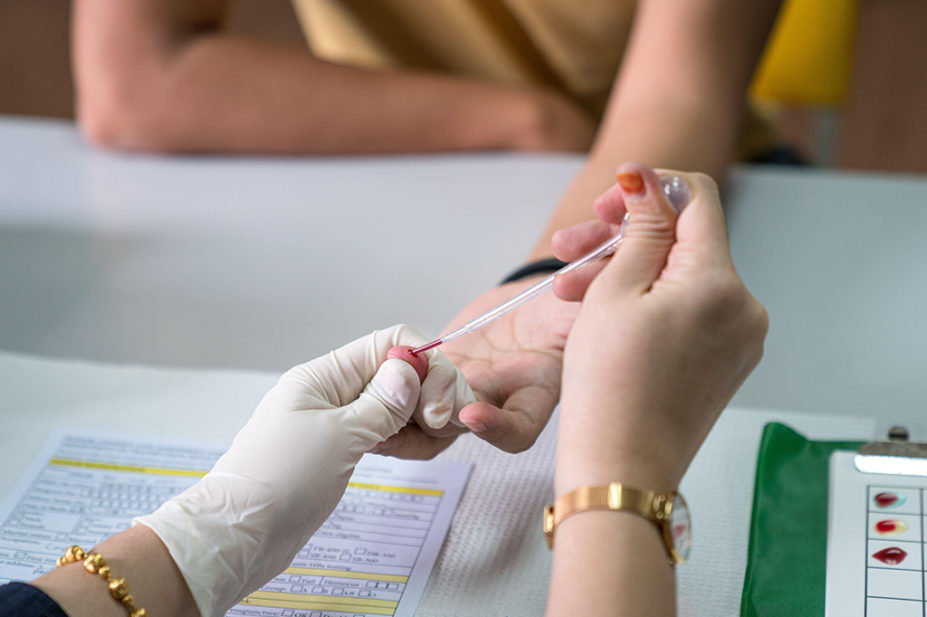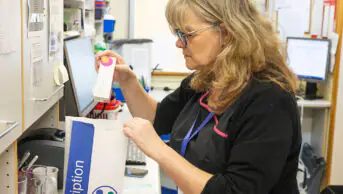
Sin See Ho / Alamy Stock Photo
Just 21 pharmacies across England have carried out testing under the community pharmacy hepatitis C antibody testing service since its launch, according to data obtained by The Pharmaceutical Journal.
This is despite more than 650 community pharmacies registering to deliver the service since September 2020.
The figures, provided by NHS England in response to a freedom of information request on 20 December 2022, also revealed that, as of 31 August 2022, the participating community pharmacies had carried out a total of 565 hepatitis C antibody tests.
In September 2021, The Pharmaceutical Journal reported that, as of 30 April 2021, 119 hepatitis C antibody tests had been carried out, meaning an additional 446 have been carried out in the 16 months since.
The hepatitis C antibody testing service is an advanced NHS service, through which community pharmacies are able to offer testing for the hepatitis C virus to people who inject drugs but are not currently accessing community drug and alcohol treatment services.
It was expected to launch in April 2020, but faced delays owing to the COVID-19 pandemic and was instead launched on 1 September 2020.
Alastair Buxton, director of NHS Services at the Pharmaceutical Services Negotiating Committee (PSNC), said that community pharmacy hepatitis C testing was always expected to be “a niche service”, owing to the “very restrictive” cohort of patients chosen by the NHS for testing in pharmacies and the “relatively short” period of commissioning.
“Additionally, the funding for the service was not considered adequate by the committee to cover the costs of setting up and providing the service, particularly where the number of potential eligible patients for an individual pharmacy was likely to be very low,” he said.
“The NHS would not agree to PSNC’s proposal for a setup fee to cover the upfront costs and contractors therefore needed to carefully consider whether the service would make economic sense for them to provide.”
Participating pharmacies are reimbursed £36 for each point-of-care hepatitis C test performed.
Ryan Buchanan, associate professor of hepatology at the University of Southampton, is currently involved in a piece of work to understand why uptake of the hepatitis C testing service in community pharmacies is so low.
“We’ve compared the NHS England service, as it’s been commissioned, against [other pilots in England] that have been successful at implementing hepatitis C testing and there are some key differences,” he explained.
“One is that, where pilots have been implemented, generally speaking, the eligibility criteria for people to have a test is broad; the pilot we did locally was literally anyone with a risk factor as defined by the NICE [National Institute for Health and Care Excellence] guidelines.
“We found that this increased the acceptability of uptake and the acceptability of delivery by pharmacists because it was a service for the whole community rather than something specifically focused on people who inject drugs.”
Buchanan said that the “real flaw” in the NHS England service was that community pharmacies can only test people who are not engaged with other community drug support services.
“It’s hard to define who that is,” he said, adding that it “dramatically reduces the pool of people that are at high risk of hepatitis C and should receive testing in whatever setting they happen to encounter …that’s a great shame.”
According to the service specification, the service was initially set to run until 31 March 2022.
However, in April 2022, NHS England and NHS Improvement, the Department of Health and Social Care and the PSNC agreed that the service should continue to be commissioned until 31 March 2023.
“Nationally, we need to sit down and design what we want the testing footprint to look like in the future in order to sustain low levels of hepatitis C,” said Buchanan.
“My personal feeling is that a properly implemented pharmacy program should definitely comprise part of that.”
The UK is a signatory to the World Health Organization’s goal of eliminating hepatitis C by 2030.


